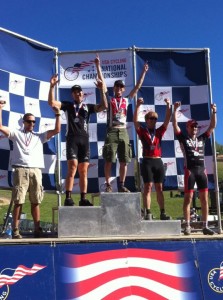MTBRaceNews.com originally posted this Q&A article.
Question: Can road racing improve my abilities as a mountain bike racer and should I work it into my training plan?
Answer: Even with all of their inherent differences, mountain bike racing and road racing share a core group of physiological requirements that greatly affect one’s performance in either discipline. Of course this doesn’t guarantee that a racer can go seamlessly from one discipline to the other since there are also specific challenges that are unique to each. By no means does road racing need to be included in a mountain biker’s preparation, but in some circumstances it can be a suitable option and something fun to try. Keep in mind that there are always tradeoffs and alternatives when it comes to training, and for some mountain bikers it might make sense to include some road racing. Let’s consider when and where road racing might work well for the mountain biker racer who is interested and/or has the option to include it into their season.
Prior to the mountain bike season when a rider is ready to begin incorporating race specific intensity can be an opportune time to for some road racing. Such races can provide the necessary training workload so that rider has a racing option rather than the intense solo ride alternative. For most, the race environment makes the intensity a more positive stress when compared to the option of doing the same amount of high intensity riding on a training ride. Since road racing is primarily serving a training purpose, tactics can be set accordingly. If long steady efforts are the goal for the current training cycle, then pulling and/or chasing frequently will certainly be a beneficial means to that end. Race courses with long climbs are great for working on sustainable power. If seeking to train anaerobic capacity, then making repeated hard efforts in attempt for a breakaway could be appropriate, or look to do some criterium racing perhaps. Depending on the course profile and the desired training effect it’s important to always have a game plan and do your best to execute it. Being tactically active in the race will keep it exciting and you’re more apt to improve your tactical know-how as a result.
During a long mountain bike season it can be helpful to interject road racing as a means to change up the routine. Most riders will benefit from the change in pace and upon return to the mountain bike scene; motivation and also fitness will have improved. Racing off-road more weekends than not for a four to six month-long season without a break is unrealistic for most. A two to four week-long block with a focus on training and/or road racing can be a way to break up an otherwise overly long season. Getting away from the mountain bike races for some training and perhaps some road racing will allow for better performances in the second half of the mountain bike season.
Road racing can be an excellent means of training for the mountain biker who is interested in improving their overall versatility as a cyclist. It can be a great supplement to the training, but it’s not necessarily the best option for everyone every time. Road racing usually requires some travel and it can be more of a ‘production’ than a training ride would otherwise be. This additional stress of racing can take a negative toll and it’s important to recover adequately from it all. Depending on the details of the road race, it might not provide an adequate training stress (too short of distance) and a training ride could be a better option if the workload needs to be particularly high. It’s important to always consider the many alternatives that exist to further improve your racing abilities. For many of us mountain bike racers, spending some time racing on the road can further our fitness, tactical know-how, and provide us with a healthy break in routine. Just be sure that the training stress you’ll accumulate in road races meets or exceeds that which you might be otherwise be perfectly willing to do on your own and you’ll come out ahead. When road racing is interjected at opportune times your fitness and therefore mountain bike results stand to improve. Have fun with it, learn from the experience, and see if it might be a good option for you.


